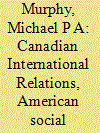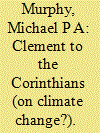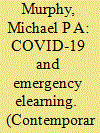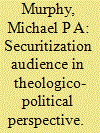|
|
|
Sort Order |
|
|
|
Items / Page
|
|
|
|
|
|
|
| Srl | Item |
| 1 |
ID:
174043


|
|
|
|
|
| Summary/Abstract |
The last two decades have witnessed growing attention to the “Canadianization” of the field of International Relations. In this article, we forward a novel approach to testing the influence of domestic factors in Canadian International Relations. By analyzing the reading lists of comprehensive examinations from Canadian doctoral programs in International Relations, we can understand the ways in which Canadian institutions’ reading lists construct the hierarchy of the field’s journals. Among these journals, those based in the United States are most frequently assigned, with others hosted in the UK and around Europe. Canadian journals are rarely assigned to reading lists. French-language journals are also rarely assigned to reading lists, even in francophone institutions, and when they are, the journals are much more likely to be hosted in France than in Canada. We offer a series of guiding questions for future consideration of the “Canadianization” of International Relations education in Canada.
|
|
|
|
|
|
|
|
|
|
|
|
|
|
|
|
| 2 |
ID:
190300


|
|
|
|
|
| Summary/Abstract |
After decades of critical scholarship calling attention to the dangers of emergency powers, many critical theorists and political activists are now turning to those same tools to combat climate change. The Climate Emergency Declaration movement advocates directly for the declaration of political states of emergency in jurisdictions across the globe. This article intervenes to recall the danger of emergency powers, with particular attention paid to the crucial role played by the political state of emergency (originally l’etat de siege fictif) in nineteenth-century France in the development of emergency power doctrine and twentieth-century authoritarian sovereignty. The second half of the article looks for an alternative, arguing that the radical and emancipatory response to the threat of climate change ought to be grounded in a political theology of ‘sojourning’, rather than the exception, drawing on the First Epistle of Clement of Rome to the Corinthians, as well as the commentary on that letter by Giorgio Agamben. This theologico-political response to the ethics of climate change furthers the scholarly debate on political theology and International Relations theory by engaging one of the crucial challenges of the twenty-first century and by developing a potential model for theological discussions of ethical problems beyond religious moralising.
|
|
|
|
|
|
|
|
|
|
|
|
|
|
|
|
| 3 |
ID:
172110


|
|
|
|
|
| Summary/Abstract |
The COVID-19 pandemic quickly led to the closure of universities and colleges around the world, in hopes that public health officials’ advice of social distancing could help to flatten the infection curve and reduce total fatalities from the disease. Drawing on Copenhagen school securitization theory and analyzing 25 declarations of emergency eLearning at American universities, I argue that in addition to COVID-19 being framed as a general threat, face-to-face schooling was also presented as a threat through these policies. A review of securitization theory—with particular attention to the question of advocacy and the relationship of desecuritization to emancipation—grounds the investigation theoretically. I argue that securitization theory is an important tool for educators not only for observing (and understanding) the phenomenon of emergency eLearning, but also for advocating the desecuritization of schooling after the COVID-19 crisis passes.
|
|
|
|
|
|
|
|
|
|
|
|
|
|
|
|
| 4 |
ID:
172289


|
|
|
|
|
| Summary/Abstract |
Over the past two decades, securitization theory has developed into a robust literature of cases and critiques. The vast majority of the attention paid to securitization has been to the securitizing actor and the referent object, leaving the audience – the body that determines the fate of a securitizing move by accepting or rejecting the securitizing actor’s request – undertheorized. The audience is presented as a problematic contradiction, because as a collectivity called by the securitizing actor it appears to be a passive body, critiqued thereby as potentially irrelevant. On the other hand, both the original Copenhagen school formulation of securitization theory and many of its current theorists reaffirm the agency of the audience to actively determine the success or failure of the securitizing move. This article turns to political theology for guidance, and explains the contradiction of the passive/active audience through homology to the ekklesia and the acclamation of ‘amen’ in liturgical doxology. The fact that the congregation is passive recipient of a call does not negate the essential and substantial role that it must actively play, just as the contradiction of the passive/active description of the securitization audience is not a problem of illogic, but a paraconsistent truth.
|
|
|
|
|
|
|
|
|
|
|
|
|
|
|
|
|
|
|
|
|